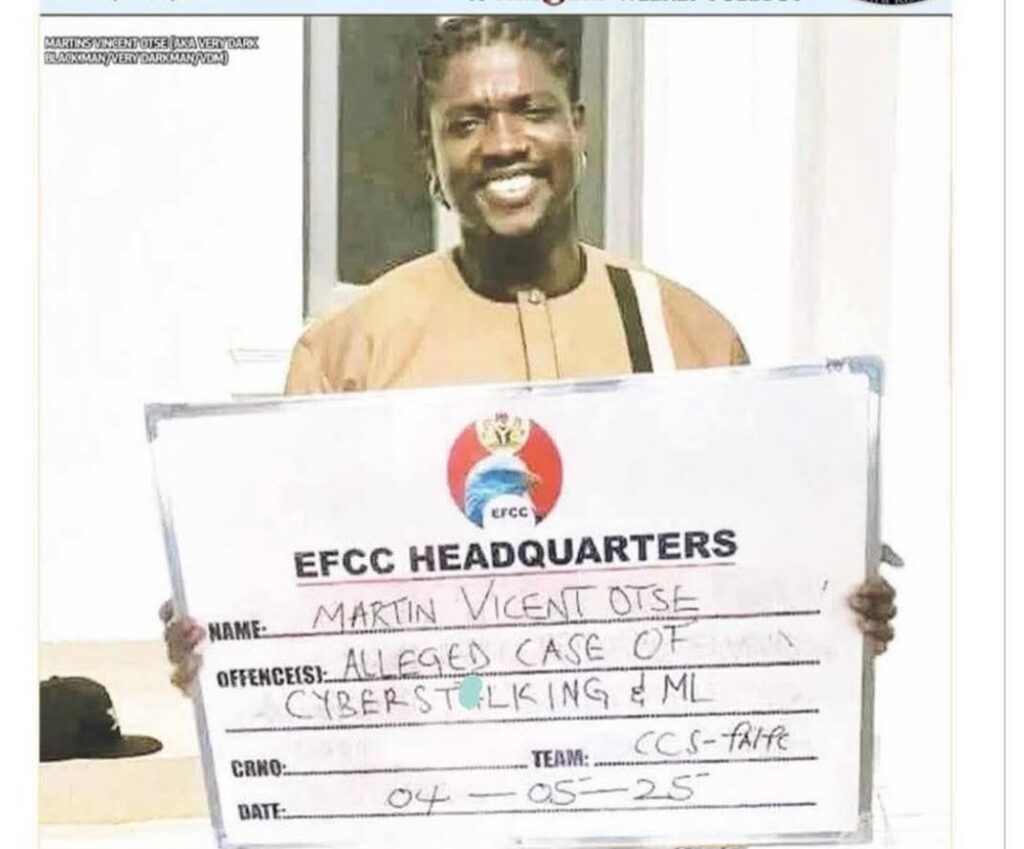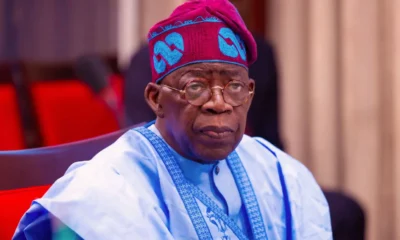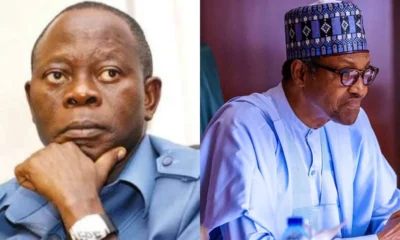EDITORIAL
VERYDARKMAN: Cyberstalking or Gagging?

Out of nowhere, a young and energetic social activist, Martins Vincent Otse (aka Very Dark Black Man/VeryDarkMan/VDM), emerged and created some storm in the Nigerian social media space. Initially, he was largely unknown.
Subsequently, as he started to gain popularity, some called him a rabble-rouser, others, an attention-seeker. But, whatever else he may be, today he is what is called an “Influencer”, finding support from social media with over two million followers on Instagram alone. He appears to have stepped on a good number of toes, and his stature has grown to the discomfort of some highly placed Nigerians. For a while, VDM had been on the radar of the EFCC and DSS.
His eventual arrest outside the premises of a branch of GT Bank in Abuja, elicited wide national outcry particularly because of the mode of arrest. Although he has been granted bail, THISDAY LAWYER sought the views of some Lawyers on what constitutes cyberstalking, one of the allegations the EFCC has levelled against VDM, and the manner in which he was arrested, which his followers say was unwarranted, even unlawful
VDM’s Arrest, Gagging Dissenting Voices
Kunle Edun, SAN
Section 39(1)of the Constitution of the Federal Republic of Nigeria, 1999 as amended, guarantees every Nigerian the right to freedom of expression and hold opinions, and to express same in any form he desires. Expression of opinion on the social media space, is an acceptable medium. Democracy itself requires certain fundamental rights of the citizens to be guaranteed, to avoid a situation where authoritarianism will be the order of the day. Every responsible Government and institution, must see it as a necessity, Citizens’ call for accountability.
The recent arrest of Martins Otse aka VeryDarkMan (VDM) allegedly on the basis of statements he was said to have made on the social media, and which EFCC which allegedly claimed amounts to cyberstalking is very concerning. While I will not comment on the merit of whatever allegations the EFCC may have against him, it must be stated that the constant resort to the Cybercrimes Act to prosecute Nigerians who criticise actions and inactions of Governments, institutions and personalities, is becoming consistently disturbing. It is another way of the Government bringing from the backdoor, the law of sedition which has long been removed from our statute books, and condemned by several judicial authorities as a colonial relic.
The detention of VDM for several days, obviously is unconstitutional, except the EFCC obtained a remand order from the appropriate court. This also brings to the fore, the issue of the seeming abuse of the issuance of remand orders by the courts. Since the allegation has nothing to do with the commission of any capital offence, and that VDM has not been known to be a flight risk, I make bold to say that, if he was detained on the basis of a remand order, then it is an abuse of the exercise of judicial power by the court that issued it. The grant of administrative bail on the very day of arrest would have sufficed, but we all know that security agencies in Nigeria arrest in almost all the cases they handle before they investigate, which is unconstitutional, because a person cannot be arrested and detained, while the security agency is looking for evidence to prosecute him.
The penchant of the security agencies to arrest first before investigation of the allegations, is characteristic of our security agencies and now seems to be the accepted trend. Our courts need to do more, to curtail this uncivilised attitude. Courts should also be wary before issuing remand orders in cases that are not necessarily violent in nature, or constitute severe crimes or felony. Even in cases of severe crimes, unless there is some evidence incriminating the suspect, there should be no basis for his detention. Such persons should be granted bail on reasonable terms, not on terms that are herculean and likened to asking the suspect to deposit his liver and kidney before he can be granted bail. That is not bail. Some of the actions of these security agencies actually de-market Nigeria in the international community, and should stop if we must have a thriving democracy. Dissenting voices should not be gagged, if democracy must survive in Nigeria
Kunle Edun, SAN
VDM’s Arrest: EFCC Criminalising Freedom of Expression
Ebun-Olu Adegboruwa, SAN
The Constitution grants the right to personal liberty to every citizen in its Section 35, subject to restrictions based on reasonable suspicion of the commission of any crime.
Where arrest is effected in any area close to a court, the citizen must be charged to court within twenty four hours of the arrest, or be released on bail. The arrest can take place anywhere, so it is not illegal to arrest anyone in a bank or other location, but the important thing is to respect the fundamental rights of the individual by ensuring that he is not detained indefinitely, or beyond the period prescribed under the Constitution.
In the case of VeryDarkMan, as the alleged offences were not capital in nature, the EFCC should have released him on bail, as keeping him in custody beyond the time required by law is tantamount to fishing for evidence to prosecute him.
The appropriate Counsel to EFCC and other law enforcement agencies, is to be sure that there are sufficient grounds for effecting the arrest of any citizen, as the law frowns against situations where arrest takes place before the investigation commences.
In addition, we should be careful not to criminalise the freedom of expression or speech, as any person who feels maligned by any speech or publication should be encouraged to approach the appropriate court for civil redress.
Ebun-Olu Adegboruwa, SAN, Human Rights Lawyer, Lagos
Arresting VDM Before Commencing Investigation Puts EFCC in Bad Light
Anthony Aikhunegbe Malik, SAN
Unconfirmed reports making the rounds suggest that current travails of Very Dark Man [VDM], [real name Martins Vincent Otse], Nigerian social media influencer, activist and critic who is well known for his outspoken views on social issues, corruption and human rights abuses in Nigeria, revolve around the contents of a petition which alleged cyberstalking against him. Cyberstalking is a crime under the Cybercrimes (Prohibition, Prevention, Etc.) Act 2015. Section 24 of the Cybercrimes Act specifically criminalises sending via computer systems, messages that are “grossly offensive, pornographic, obscene or of an indecent, obscene or menacing character” or messages intended to “cause annoyance, inconvenience, danger, insult, injury, criminal intimidation, enmity, hatred, ill will or needless anxiety”. It further criminalises knowingly or intentionally sending false messages, with intent to cause annoyance or to deceive. However, it is important to note that Section 24 has been the subject of significant judicial scrutiny, especially the vague and overly broad language employed by the Legislature, which can easily be weaponised to stifle freedom of expression. This was the case in Okedara v Attorney-General, Federation (2019) LPELR-47298(CA). Other legislation that may be invoked to punish cyberstalking are the Criminal Code and the Violence Against Persons Prohibition Act.
Cyberstalking encompasses a range of acts that are independently prohibited under various Nigerian statutes and common law principles.
In the now notorious case of VDM, reports indicate that he was allegedly arrested without a warrant, was incarcerated in EFCC facilities for several days without being charged before a court of competent jurisdiction. These actions, if true, violate well-established constitutional and statutory safeguards. The provisions of Section 35(1) – (5) of the 1999 Nigerian Constitution (as severally altered) are very instructive. See also Sections 6, 8 and 30 of the Administration of Criminal Justice Act (ACJA) 2015. The net effect of these constitutional and statutory provisions, is the guarantee and or reinforcement of human rights protection, humane treatment and timely arraignment of any citizen arrested upon suspicion of commission of any crime. It is, therefore, right to asseverate that the prolonged incommunicado detention without arraignment and failure to inform VDM of the specific charges at the time of his arrest, if indeed true, are all in flagrant violation of these provisions.
At the risk of sounding like a broken record, I reiterate that it is runs against the grains of due administration of justice, just as it offends elementary common sense for the EFCC and other security agencies to arrest a citizen and keep him in custody before commencing investigation or subsequently shopping for remand order(s). It is arbitrary, presumptive, authoritarian, reactionary and precipitated by hasty emotional response rather than logic. Nothing justifies such condemnable and unconscionable practice, in any modern society. In point of fact, it is one practice that puts us in bad light in the comity of decent nations.
Anthony Aikhunegbe Malik, SAN, Constitutional Lawyer, Abuja
VDM’s Arrest: No Due Process, No Accountability
Mandy Demechi-Asagba
The recent controversy surrounding the arrest and detention of VeryDarkMan (VDM) by the EFCC and alleged GTBank’s involvement, raises serious concerns about due process and accountability. The allegations against VDM include cyberstalking, which typically involves using digital platforms to harass or intimidate individuals. However, the specifics of the allegations against VDM are unclear.
The alleged cyberstalking and unlawful detention, seem to highlight potential violations of VDM’s fundamental rights.
Key Issues
1. Arbitrary arrest and detention without due process in violation of VDM’s Fundamental Human Rights under Section 35 of the 1999 Constitution of the Federal Republic of Nigeria (as Amended);
2. A breach of VDM’s Fundamental Right to human dignity – see Section 34 (1)(a);
3. Breach of confidentiality by GTBank, if the bank had anything to do with his arrest – see Section 4 of the Banks and other Financial Institutions (BOFI) Act;
4. Abuse of power by EFCC – see section 9 of the EFCC Act.
Possible Legal Remedies For VDM
1. Compensation for false imprisonment – see Section 35 (6) of the 1999 Constitution (as Amended);
2.Public apology – see Section 35(6) 1999 Constitution;
3.Institutional accountability for EFCC and GTBank.
New Development
GTBank’s recent video footage claims they had no involvement in VDM’s arrest, stating he wasn’t arrested on their premises. This contradicts earlier allegations of GTBank’s complicity.
This Twist Raises Questions:
1. Was GTBank’s denial genuine, or an attempt to distance themselves?
2. Did EFCC act independently in arresting VDM?
3. What role, if any, did GTBank play in the events leading to VDM’s arrest?
Further investigation or clarification might be needed to establish the facts. We therefore, implore the relevant authorities to carry out proper investigations on this matter.
This case highlights the paramount importance of adhering to due process, and safeguarding individual rights within a democratic society. The integrity of our legal system relies on the unwavering commitment to uphold the rule of law, lest we regress to Thomas Hobbes’ state of nature where might makes right. Compromising due process for any reason, undermines the very foundations of our democracy, and it is imperative that we prioritise the protection of individual rights and the rule of law.
Mandy Demechi-Asagba, Global President, African Women Lawyers Association (AWLA); President, Legal Pool for Justice and Equity Initiative (LPJEI)
VDM, EFCC, DSS and GTBank Brouhaha
Dr Tonye Clinton Jaja
What constitutes cyberstalking as alleged?
According to Section 24(1)(a) and (b) of the Cybercrimes (Amendment) Act, 2024 cyberstalking is defined as follows: (a) knows to be pornographic (b) he knows to be false, for the purpose of causing a breakdown of law and order, posing a threat to life, or causing such messages to be sent”.
Way and manner VDM was arrested and detained for days
The relevant Nigerian laws stipulates that detention shall not exceed 48 hours, except with an order of a court of law for any period beyond 48 hours.
Were his fundamental rights not violated?
Yes, his Lawyers can sue for violation of VDM’s fundamental rights, because he was held for five days.
Dr Tonye Clinton Jaja, Abuja
VDM’s Gestapo Style Arrest Violates His Human Dignity
Jay Jones
The name “Very Dark Man” (VDM) is one name that quickly resonates in the minds of many Nigerians, as symbol of the fight against injustice and more of a voice that blatantly speaks truth to power without fear or favour.
However the reprehensible gestapo-like terroristic method deployed in effecting his arrest outside the premises of GT Bank negated all known acceptable tenets for respect for human dignity, and was more like a scene in James Bond’s 007 movie. This unpopular methodology has been attributed to the present administration’s tendencies towards dictatorship, and more especially it’s desperate attempt to gag all dissenting voices against the government of the day, using trumped-up charges of Cyberstalking crafted from the omnibus Cybercrime Act of 2015.
Section 24 of the Cybercrime Act, 2015 attributes Cyberstalking as any act which denotes the utilisation of the Internet or Social media platforms to issue out offensive or obscene or menacing messages which you intentionally send out, knowing fully well that the content of such message is false, with the intent to cause annoyance, hatred and ill-will.
Therefore, it would not amount to Cyberstalking, where the sender believes that the information is correct and does not intend to cause annoyance or ill-feeling, but with a conviction to expose certain ills in the society, which is what VDM stands for.
CREDIT :THISDAY LAWYER
Discover more from Asiwaju Media
Subscribe to get the latest posts sent to your email.
-

 NEWS2 days ago
NEWS2 days agoDavid Beckham Hospitalized With Arm Injury As Victoria Shares Update
-

 POLITICS6 days ago
POLITICS6 days agoEbonyi Rep Member Threatens Constituent for Supporting Charity Foundation
-

 NEWS5 days ago
NEWS5 days agoCable Vandals Nabbed by Nigerian Hunters in Okpuitumo, Handed Over to Police
-

 NEWS17 hours ago
NEWS17 hours agoMan Heartbroken As Girlfriend Of 2 Years Denies Him During Interview With YouTuber Asherkine At UNN
-

 ENTERTAINMENT14 hours ago
ENTERTAINMENT14 hours agoFrank Edoho Confirms Split From Second Wife Sandra Onyenuchenuya
-

 CAMPUS REPORTS3 days ago
CAMPUS REPORTS3 days agoAE-FUNAI to Unbundle Mass Comm Programme into Eight New Disciplines – VC
-

 SPORTS3 days ago
SPORTS3 days agoVictor Osimhen Acquires 2025 Rolls-Royce Cullinan Worth Over ₦900 Million
-

 SPORTS1 day ago
SPORTS1 day agoAbakaliki FC Faces Kwara United Today in Federation Cup Final
-

 JOBS/SCHOLARSHIPS6 days ago
JOBS/SCHOLARSHIPS6 days agoCDCFIB Announces Nationwide Recruitment into Paramilitary Agencies
-

 INSIDE NYSC3 days ago
INSIDE NYSC3 days agoNYSC Officer Clarifies Allowance Payments, Warns Corps Members on BVN Errors
-

 ENTERTAINMENT4 days ago
ENTERTAINMENT4 days agoTems Gifts Fan ₦3 Million For Stunning Crochet Portrait
-

 NEWS4 days ago
NEWS4 days agoIGP Confirms Arrest Of 26 Suspects Over Yelewata Massacre That Killed 47 In Benue






















